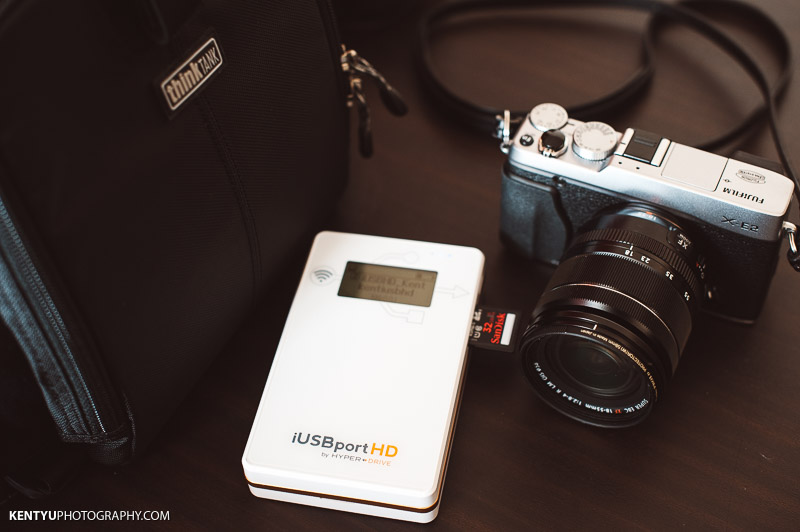If you like this post, help us share it
A question that has always come up is What is the easiest way to backup photos on the road without a computer? As a photographer when I am travelling, I want to ensure all my travel photos are safe until the end of the trip. This means backing up photos is a priority especially if it is a photography trip. Most people are not going to travel to the same holiday destination twice, so the photos and videos taken during the trip are some what sentimental, particularly if it is a once a life time trip. There are a number of ways to backup your photos on the go, but I have specifically chosen the Sanho iUSBport HD for a number of reasons which I will explain later.
iUSBport HD Key features
- Built in SD card slot
- One button backup operation
- Two way File Transfer
- USB 3.0 connection with a 2nd 5W (5V/1A) powered USB 2.0 host port
- Support Wi-Fi 802.11b/g/n Ad-Hoc, Access Point and Infrastructure Mode
- 3850mAh Lithium Polymer Battery, Rechargeable via Micro USB
- Up to 8 hours battery life
- Auto turn off
- Incremental backup
- Works while charging
- Support HTML5 Web, iOS and Android app
- Support HTTP, FTP, WebDAV, DLNA, uPnP, PTP, SMB, Samba severs
- Support FAT32, NTFS, HFS, HFS+, exFAT, EXT 2/3
- Dimension 134 x 82 x 24mm
- Weight 185g
The obvious backup solution if your camera support it is to shoot with two memory cards (duplicate) and replace the two cards together once they are filled up, so you have two copies. As the price of CF and SD cards are relatively cheap, this is becoming more practical and the number of cameras that feature dual card slots has also been on the rise. 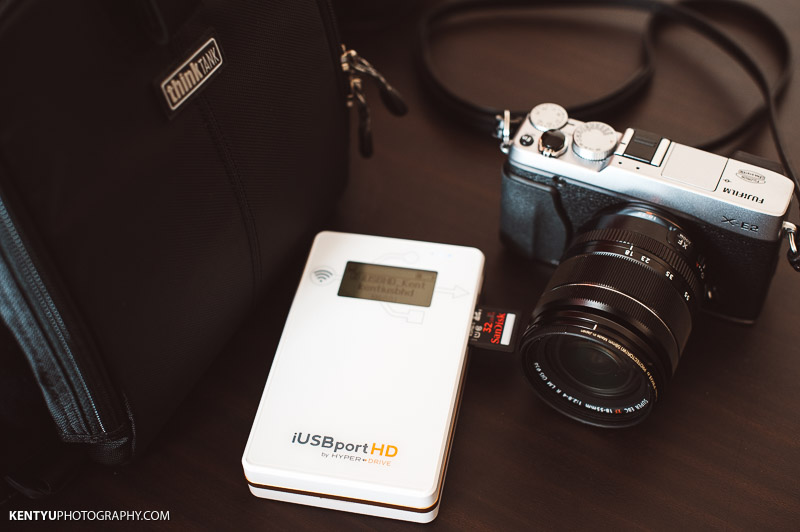
If your camera doesn’t support dual slot like my Fujifilm X-E2, then even if you have plenty of memory cards, you are still not safe with only one copy of your photos. An effective way to backup the photos is using a laptop and a memory card reader if you don’t mind carrying a laptop to travel. It is pretty common for people to take their laptop so they can get online and check email back in the hotel. For those who want to carry a bit less try using a netbook , most of them are fairly cheap and comes with 500GB internal disk space and a built in SD slot for transferring photos.
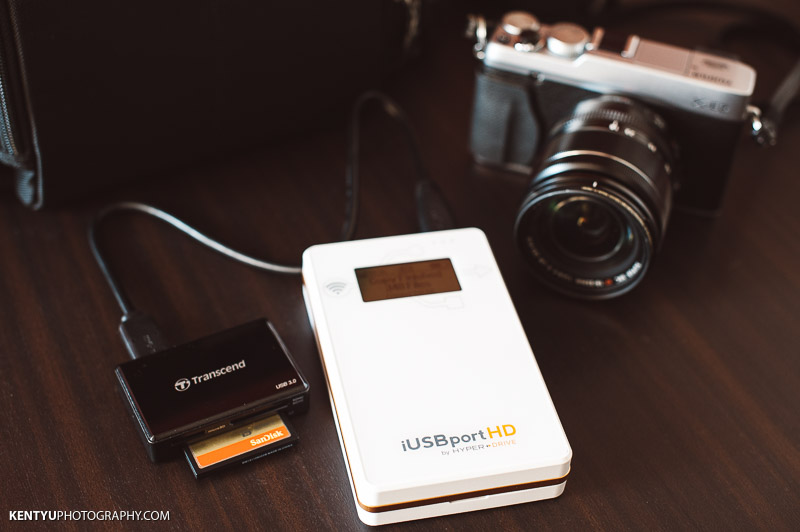
To be honest, with iPads and Tablets being so powerful these days, who wants to carry a laptop anyway. Unless you are on a photography trip and expected to do photo editing during your travel, then you have no choice but to bring a laptop. For those who wants to travel light or to backup on the go, a portable photo backup device seems to be a better choice. I have chosen the iUSBport HD for a number of reasons. The Sanho iUSBport HD is more than just a photo backup device, it is also a travel companion that acts as a wireless storage device I can stream movies, music and photos from. It has built in WiFi so I can connect my iPad, iPhone and Tablets to it from anywhere. What makes the iUSBport HD unique is its additional USB host port (5W powered) that allows another USB device to be connected, expanding its capacity and turning anything connected to it wireless. The iUSBport HD is also a portable battery bank via its powered USB host port. It is good for emergency but i won’t use it often since the internal battery is only rated at 3850mAh.
The main reason I chose the iUSBport HD over other 2.5 wireless portable hard drive is because I need it to read CF cards as well. My DSLRs take CF cards only, so there are times that I need to back up my CF cards which standard wireless hard disk can’t read. Other smaller wireless devices like the Kingston Digital 5-in-1 Mobile Companion or iUSBport Mini are cumbersome because you have to connect an external hard drive to it. Comparing iUSBport HD to Hyperdrive Colourspace, Hyperdrive is a more complete photo backup device with built in CF and SD reader. Its transfer rate is also much faster (27MB/s vs 9MB/s) than the iUSBport HD. But there are some nice features offered by the iUSBport HD.
| iUSBport HD | Hardrive Colourspace | |
| Media Slots | SD | SD+CF |
| Transfer speed | 9MB/s | 27MB/s |
| Battery capacity | 3850 mAh | 2600 mAh |
| Battery life | 8 hrs | 5 hrs |
| USB connectivity | USB 3.0 | USB 2.0 |
| Wifi | Internal | External |
| Price | $159 (Case only) | $249 (Case only) |
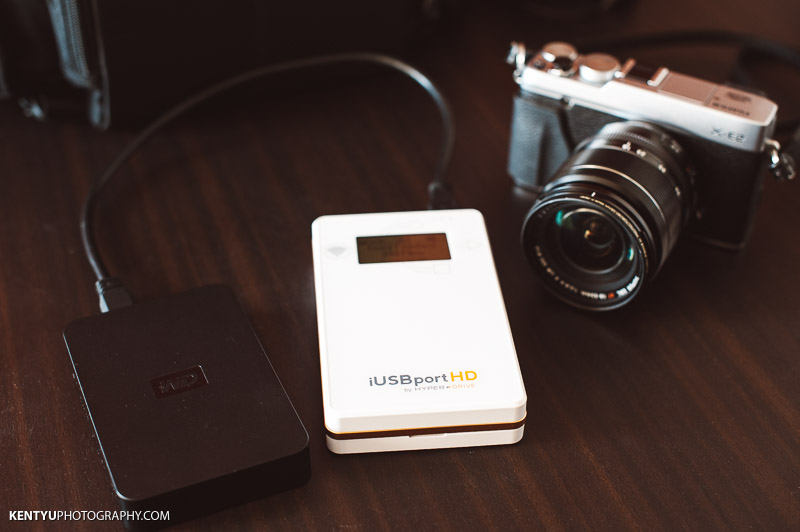
If you are purely looking for a photo backup device then the Hyperdrive is on the top of the list, but for me the fact the iUSBport HD has a better battery life, internal Wifi (smaller), USB 3.0 and a USB host port is a better travel companion to me. I can connect a card reader to make it CF compatible. The USB 3.0 connectivity is a huge selling point since the last thing I want to experience at the end of the trip is to wait for GBs of photos to be transferred over. Also I am using the device to stream movies and videos so a fast USB connection is great to transfer the huge media files. The battery life on the iUSBport HD is 33% better, so it is more likely to last through the day.
I have done some speed tests and found the device to be as good as any other portable wireless hard drive like the WB My Passport Wireless and Seagate Wireless Plus. While the USB 3.0 transfer speed is blistering fast measured at 110MB/s read and write, the transfer rate via memory card reader (connected to the USB host port) and SD card reader is not so fast. It takes about 4.5mins to transfer 2GB of data. That is three time slower than the Hyperdrive Colourspace. The Wifi transfer speed is as expected at about 3-4MB/s (slower if via the same Ad Hoc network), so if you are to transfer anything to the hard drive, make sure you are doing it via wired.
| USB 3.0 Speed | Read (MB/s) | Write (MB/s) |
| Sanho iUSBport HD | 110.3 | 109.6 |
| WD My Passport Wireless | 91.5 | 113.6 |
| Seagate Wireless Plus | 115.5 | 114.4 |
Speed comparison between Sanho iUSBport HD, WD My Passport Wireless, Seagate Wireless Plus
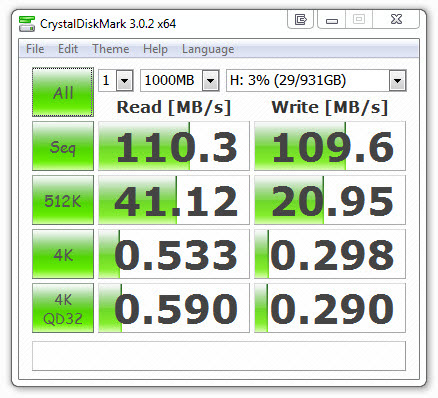
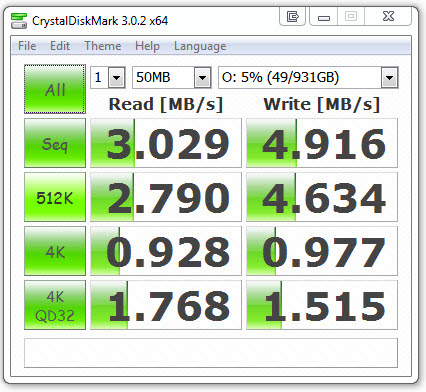
iUSBport HD USB 3.0 transfer rate iUSBport HD Wifi P2P transfer rate
In use
The iUSBport HD is small at twice the thickness of a standard external 2.5” Hard drive, it goes to travel with me all the time. For CF cards backup, I connect a card reader to it otherwise the built in SD slot is as good. The iUSBport HD is not suppose to be used on the field as a “Shoot and Dump” device. Its transfer rate is not particularly fast. I use it to backup photos at the end of the day or whenever the opportunity arises, plug the memory card to the device and it will automatically ask whether you want to copy the card, press the power button once to confirm and that’s it. It will take about 45mins to transfer 20GB and follows the same folder structure as in the card. The device automatically turns off once the transfer is completed so you know it is not wasting battery. It is worth to mention that the device also works while being charged, so normally I would set it to backup the card and leave it on charge before going to sleep. It would turn itself off after the transfer and be fully charged the next day. The backup is incremental so you can continue to use the same card and only copy the new files on the next backup.
For streaming, it is capable of connecting up to five devices. The bandwidth is quite limited so if you have more than one device, it is a good idea to connect one after another. I had no problem of streaming movies with three devices via its Wifi.
Browsing images on the iUSBport HD or via its SD card slot can be done using the iUSBport app. The app is quite basic, it will automatically shows the iUSBport HD once you are connected to the device. From there you can go to each folder and move, copy, delete or view each file without copying to the iPad. Just to be aware that there is a slight delay when browsing photos via Wifi.
A couple of concerns with the iUSBport HD is that if you set a password for the built in Wifi, the password is displayed on the LCD, so anyone who has the device can see the password and be connected to it (the ip address is also being displayed). The app would be better if it support direct Cloud backup to Google drive or Dropbox.
Overall, the iUSBport HD is a reasonable photo backup device even though its backup speed is not particularly fast. But since I don’t backup on the fly it works out for me by leaving it to copy at the end of the day and allow it to turn itself off. The battery life is good which means I can use it as often as I can and since it works while charging, there is practically no downtime. While the price tag is not the cheapest being $70-$80 more than other standard 2.5” wireless hard drive, it is reasonable compare to the Hyperdrive Colourspce ($90 more) and Epson P-6000 (heaps $$ more).
Here is my recommendation
If you need the absolute fastest photo backup device, get the Sanho Hyerpdrive Colourspace (Case only).
If you are like me who works with CF card and transfer speed is not a concern, get the iUSBport HD
If you are only working with SD card, get the Seagate Wireless Plus or WD My Passport Wireless
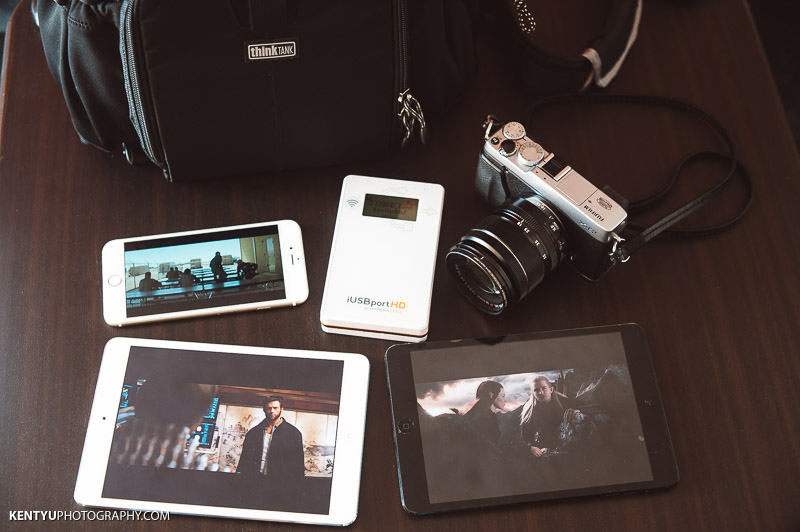
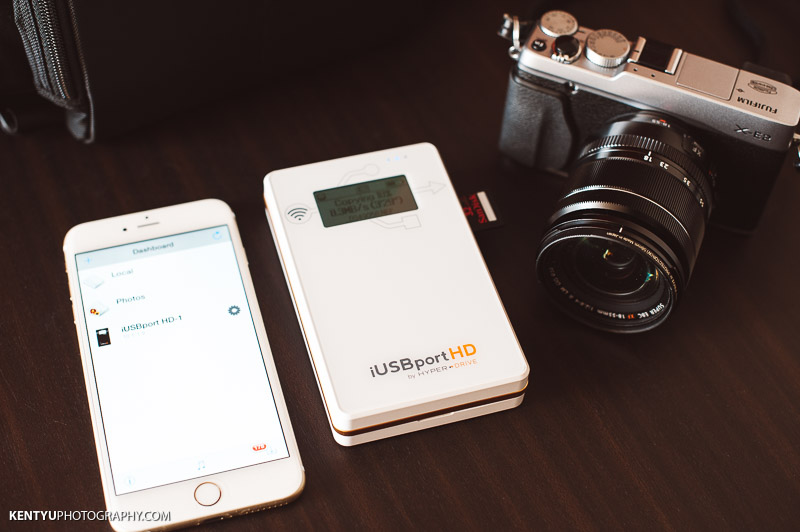
Where can I find the equipment seen on this site?
If you find this site useful and planning to purchase any of the equipment seen on this site, please show your support by purchasing your photo equipment at B&H Photo Video, or through any of the affiliate links seen on this site.


